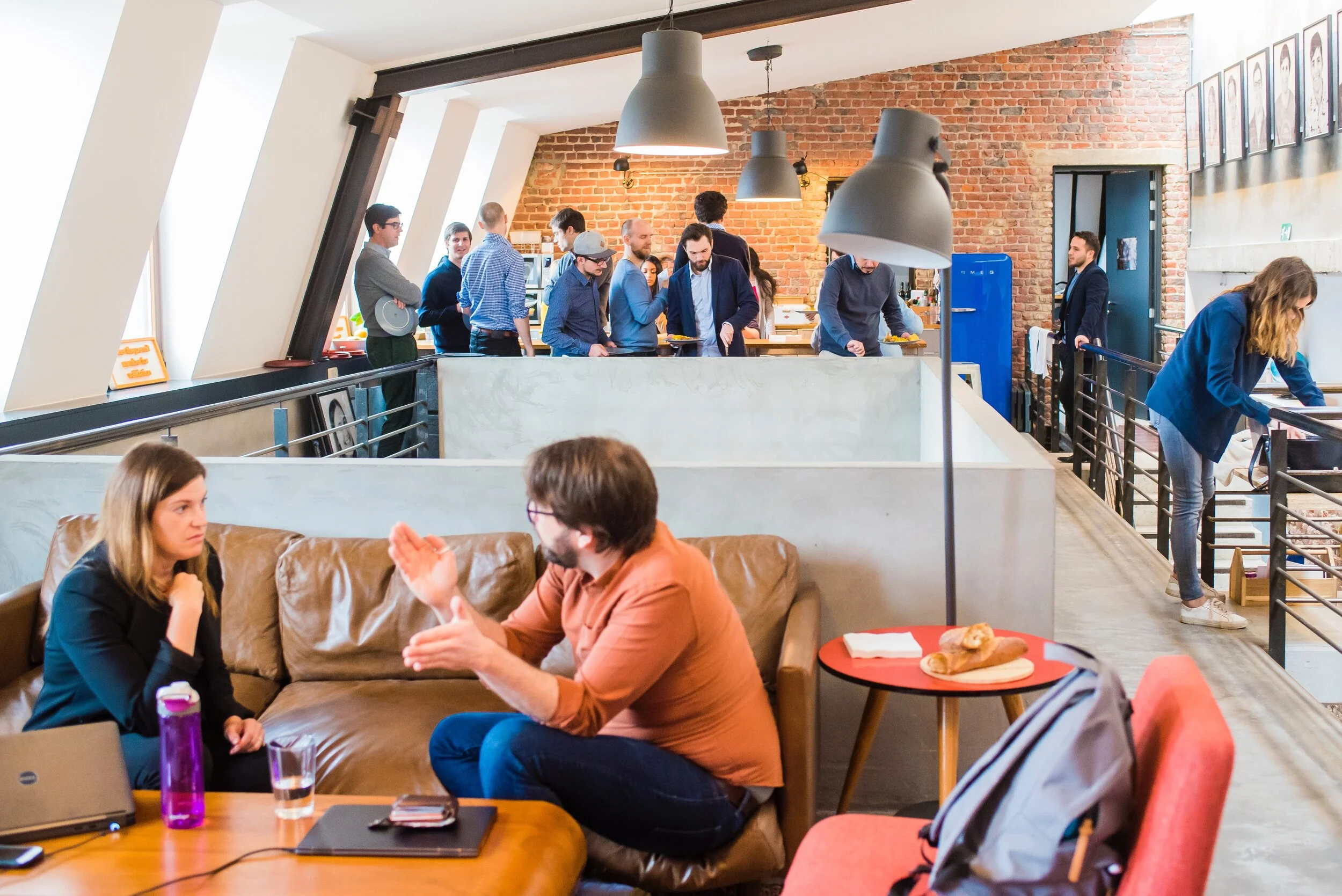The Office Is Dead! Long Live The Office!
This article was originally published here by Medium
— by Eddy Badrina
The Rise of “Office Optional”, and how entrepreneurs and leaders ought to approach the office place, post-COVID
I think it is safe to say that, as we reopen office spaces around the country, the way we view their utility and function will change. These past 8–10 weeks have arguably been the biggest organizational psychology experiment in the history of man. Were it only a week or two, most people could and would probably revert to old habits and views of the office environment. But past 30 days, new habits form, and conventional wisdom begins to be questioned. Even amongst the most seasoned executives, many of whom have found themselves working out of bedrooms and closets, the very idea of “office space” is being challenged.
Talking regularly with my cohort of entrepreneurs and operators, I see a growing trend in how our offices will be reconfigured for usage. Call it the rise of “office optional”. I predict three distinct uses coming out of this trend:
The office is still essential, but…
My team at BuzzShift has found that they have been VERY productive working from home, probably even more productive that pre-COVID. And they do their work in less time, have less of a commute, and save money (they are eating out less, spending less on gas, etc.). In fact, they are almost TOO productive, and our leadership team has had to gently remind some of them to shut it down at 5:30pm, and not work on the weekends. That’s a good problem to have, and we are proud of them for their work ethic.
However, some team members have been honest about not getting their best ideas germinated and developed because the IRL collaboration is not there. In our industry, creative collaboration is THE differentiator in our deliverables, and it goes without saying that creative problem solving is essential across almost all organizations and industries. This collaborative creativity is not impossible through remote work, but it is made infinitely easier (with the proper frameworks) when people are all together in the same room. It’s qualitative, but it is a real thing. So if the office is considered a tool in your business arsenal, and an expensive one at that, then the highest and best use of office functionality is a gathering place for creative collaboration. I predict you will see offices turn into spaces that both inspire a creative group dynamic, as well as encourage individual and small meeting “deep work”. Our current traditional desk space fulfills neither of those needs.
Perks Perks Perks
This sounds a bit contrarian, but I also predict the best and most innovative companies will make their offices a more deliberate part of their employee retention strategy. For businesses that are geographically scoped, the attraction of a corporate office that is a creative alternative to their home office setup is definitely alluring. Employees will weigh out the pros and cons of working from home, but I foresee a not-to-distant future where people who work from home for the majority of time, and love doing it, will still want an alternative space and change of scenery every once in a while. Creating a private club feel for its employees, where they can go and work, know the people around them, but not be in a corner coffee shop — that’s an intriguing setup for any business, and an attractive one for employees. I can also see a large portion of that being outdoor space as well. I know that fresh air, green space and reliable WiFi is an unbeatable combination for a lot of workers.
Pressure Valve
The last facet of this trend is the most practical, and the most overlooked. People who work from home, especially if they have kids or have a partner who is also working remotely, need pressure valves from that routine. While the dream is to “Tim Ferriss” it and work from exotic locales, the reality is that for the vast majority of workers, they can’t or don’t want to make that jump. Maybe they have kids in school and don’t want to roam the world and homeschool. Maybe they have a partner who isn’t interested in that lifestyle. Maybe they like the stability of an honest-to-goodness home. Combined with the fact that the collaborative nature (see point #1) of their jobs may not allow them to do that type of work configuration, employees may want the next best thing in an office space that they can “get away” to during the work week. It sounds weird, but I do believe it will happen.
If you are a business owner or operator with traditional office space, now is the time to rethink and reshape your work environment. We are all in survival mode, but it doesn’t mean that you stop looking ahead to the future. Good leaders were built for times such as these, and vision is even more essential now. In the coming years, look for the best companies to employ the brightest minds in architecture, interior design, landscaping, and organizational psychology to convert their commercial office spaces from bland necessity and contrived delight, to true centers of collaboration and creative inspiration.
Related articles
Our approach may be limited in its effectiveness to change the nation but is very effective for the few we reach by our limited efforts.
Susan, a competent young professional, looked worn and defeated. In talking about her workplace, she told us that bickering, criticism, and lack of support had spread through her organization – a workplace she used to love. Now, she said, “The tension here is so thick I hate going to work. Actually, right now, I hate my life.”
No one thrives in a toxic workplace… but how do we avoid getting there in the first place? Here are four behaviors that contribute to a toxic workplace—and how you can avoid these common pitfalls.
If you feel that Christ is calling you to use your talents as an entrepreneur, consider going into business with a friend.
Lifestyle leaders focus on modeling the values and beliefs that they see are essential to the organization's success. They also focus on gaining influence with constituents in their development and performance.
Ministry in word is a foundational mark of the Faith Driven Entrepreneur. Here’s some inspiration for starting a workplace faith community.
As you dream about why your faith community should exist, consider how much time is available for each meeting (e.g., a noon-hour gathering only has about 50 minutes of time). What can you realistically accomplish in the time available?
If there is a problem today, then regardless of who’s fault it is or where it came from, we are leaders and leaders solve problems – so what are we going to do about it?”
An embassy can only exist in a foreign territory if they are welcomed there. In the same way a Christian ERG needs to be cognizant of and respect the conditions under which they are welcomed into the organization.
A Lean organization maximizes customer value by continuously eliminating waste in its process with the goal of creating more value using fewer resources.
At LivFul we believe a company can be a tool for bringing shalom to this very dark world, a world where things are missing and broken, and that it should actively work towards the setting right of things
Henry Ford, the great industrialist inventor of the automobile, once said that he looked for men who had an infinite capacity to not know what couldn’t be done. Daryle Doden, CEO of Ambassador Enterprises, is a personification of this ideal.
For shalom is more than peace. Shalom means relationships that are in every conceivable respect clarified and reconciled. Shalom is deep connectedness with one another - vertically (with God) and horizontally (with people). Shalom is cohesion that withstands every ordeal of external forces.
I believe that Christian business is called to attend to the welfare of the community within which it operates.
The Lone Ranger persona is a common attribute of an entrepreneur. But is it accurate? Or even helpful?
We’re living in a time of extremes that are testing our faith and testing our businesses. The COVID-19 pandemic has forced changes in how we operate on a daily basis.
Isn’t it interesting to think about how and when friendships start? A year ago, I did not know my friend, Judy.
While many companies in recent years have spent some time developing their core values, they often end up gathering dust on the wall, ignored and irrelevant. If so many leaders and consultants champion them as a vital part of your organization, why does this happen?
There are always challenges to developing productivity teams. Individual egos, agendas, capabilities all combined with unclear roles or changing priorities, will impact on how well a team works together. But, today teamwork faces a threat that is as negatively impactful as it is subtle.
Have you ever looked up the definition of pivot? What if I shared with you that we as leaders are the “Pivotman/woman” for our organizations?
Too much change overwhelms and confuses people. It can make a solid plan fall apart or never take off to begin with, and as I’ll explain, as a leader, you must be mindful about how you structure organizational transformations so you can avoid change saturation in your people.
If you are a business owner or operator with traditional office space, now is the time to rethink and reshape your work environment. We are all in survival mode, but it doesn’t mean that you stop looking ahead to the future.
We spend about a third of our waking lives at work. And yet, for the majority of people, work is not much more than a paycheck. We feel lonely, especially men. We feel like there’s a gap between our job responsibilities and our own potential. We often feel exhausted and question whether our work is making any meaningful difference.
Entrepreneurship is an extremely brutal sport and often enacts a heavy toll on its participants. The high-failure rate among start-ups is well known; what is less talked about is the personal struggles that entrepreneurs can face at deep levels, whether or not their companies ultimately succeed.
In a business world that prioritizes productivity, speed, and profits, Christians may feel like Monday through Friday belongs to the world while Sunday belongs to God. But Scripture beckons Christians toward a more holistic lifestyle. “Whatever you do,” Paul says in 1 Corinthians, “do it all to the glory of God.”
Brian Grim, the organization's president, said: "There's a lot of studies that look at how well a company does and including gender or sexual orientation or race... This is the first one to look at how they include religion." The purpose of the study is not to measure "doctrine or dogma in the workplace, but it's to help people be able to express themselves" and their faith in the workplace.
Applying biblical principles to shape best practices in business may sound challenging or scandalously illegal, but it’s surprisingly achievable and worthwhile. And while this view of stewardship may seem to be an ethereal, fluid concept, ministry can be objectively measured with worthy metrics of success much like any other dimension of thriving business.
In this video you will hear from best-selling author, Patrick Lencioni, as he presents a powerful framework and simple advice for hiring and developing ideal team players in any kind of organization.
How do we develop a biblically-based approach to appreciate what has gone before and what has worked, whilst keeping an eye towards the future as we build a new paradigm for leadership that is capable of meeting the challenges we face today?
——
[ Photo by MEDIA PROFILE on Unsplash ]






























Workplaces that eliminate email notifications, discourage out-of-hours communication and reduce email volume, save money and improve efficiency. When individual workers process their inbox less often, rather than continuously, they experience less stress without losing responsiveness.